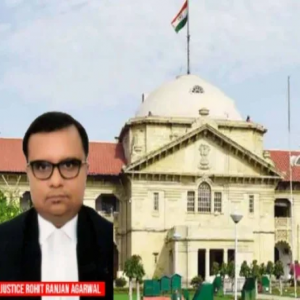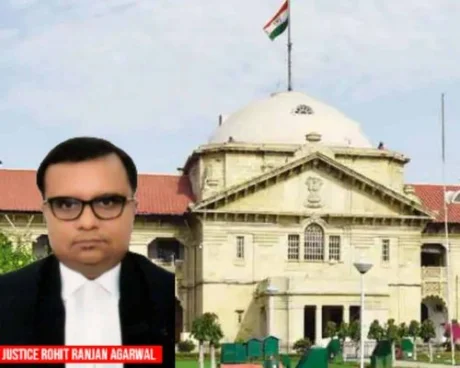
.png) Cedric Prakash
Cedric Prakash

On July 1, 2024, Justice Rohit Ranjan Agarwal of the Allahabad High Court, in a bizarre comment, said, "If this process (religious conversion) is allowed to be carried out, the majority population of this country would be in the minority one day, and such religious congregation should be immediately stopped where the conversion is taking place and changing the religion of citizen of India." The single-bench judge was hearing the bail plea of one Kailash booked under Section 3/5(1) of the U.P. Prohibition of Unlawful Conversion of Religion Act, 2021, said that Article 25 of the Constitution of India does not provide for religious conversion but only provides freedom of conscience and free profession, practice, and propagation of religion
He added that it is against the Constitutional mandate of Article 25 of the Constitution, which does not provide for religious conversion; it only provides freedom of conscience and free profession, practice and propagation of religion. The Court also noted that in several cases, the unlawful activity of conversion of people of SC/ST castes and other castes, including economically poor persons, into Christianity is being done at a rampant pace throughout the State of Uttar Pradesh. The Court, on expected lines, denied bail to the accused.
Exactly a week later, on July 9, the same judge, Agarwal, sang the exact same tune, denying bail to yet another accused in a case of alleged 'illegal conversion'. He observed that the right to freedom of conscience and religion cannot be constituted as the right to convert others! He again categorically stated, "The Constitution confers on each individual the fundamental right to profess, practice and propagate his religion. However, the individual right to freedom of conscience and religion cannot be extended to construe a collective right to proselytise; the right to religious freedom belongs equally to the person converting and the individual sought to be converted."
The High Court referred to certain sections of the UP Government's anti-conversion law. It noted that Section 3 of the 2021 Act clearly prohibits conversion from one religion to another based on misrepresentation, force, fraud, undue influence, coercion, and allurement. It further observed that the Act provides punishment for contravention of the provisions of the section, which also restricts a person from abetting, convincing, or conspiring to such conversion. Further, the Court stated that the Act was enacted with Article 25 of the Constitution of India in view, which does not allow or permit any citizen to convert from one religion to another. Bail was also denied to the accused in this case!
Within a week, the same judge gave similar orders (patently unconstitutional) and denied bail to the accused. The charges against the alleged accused are unwarranted and unsubstantiated. The counsel of the accused, in the second case, had categorically submitted to the High Court that 'the FIR does not identify any "religion converter" as defined by Section 2(I)(i) of the 2021 Act. It was further submitted that the witnesses' statements alleging undue influence for conversion were unsubstantiated. Finally, it was contended that no person who had converted to Christianity came forward to lodge a complaint. On the other hand, the AGA submitted that a case under Section 3/5 of the Act of 2021 was made out against the applicant, a resident from Andhra Pradesh.'
The points in contention are the following:
• Article 25 of the Constitution (Freedom of conscience and free profession, practice, and propagation of religion) guarantees the freedom of conscience, the freedom to profess, practice, and propagate one's religion, to all citizens;
• Whoever has claimed that Article 25 gives one 'the right to convert'?
• However, if one (an adult) freely embraces (converts to) another religion of one's choice or, for that matter, 'stops believing that God exists', who is the State or the Court to intervene?
• Where is it written that 'collective' propagation of one's religion is not permitted?
Article 18 of the Universal Declaration of Human Rights (UDHR) emphatically states that "Everyone has the right to freedom of thought, conscience and religion; this right includes freedom to change his religion or belief, and freedom, either alone or in community with others and in public or private, to manifest his religion or belief in teaching, practice, worship and observance". India is a signatory to the UDHR.
Interestingly, several BJP-ruled states in the country have enacted anti-conversion laws (Rajasthan may be the next state to do so). This is clearly a ploy, a bogey, to defocus from more serious issues which plague the country today! Without any statistics to defend his arguments, Justice Agarwal is very frightened that "the majority population will become a minority in India one day." If his 'fears' are valid, he must first answer the question WHY? Why are the people of India embracing Christianity or, for that matter, any other religion?
Instead of criminalising conversions, the learned judge should take cues from Dr BR Ambedkar about his conversion to Buddhism! Ambedkar's conversion to Buddhism was not born of fantasy nor a sudden overnight decision. He had spent over twenty years studying various religions and discerning which one would be most suited for him and the downtrodden masses for whom he spoke. Addressing a huge gathering of Mahars in Bombay in May 1936, he transparently shared his ideas on conversion and why he considered it to be the best and only route towards emancipation. He unequivocally and courageously stated, "I tell you all very specifically, religion is for man and not man for religion; to get human treatment, convert yourselves."
Significantly, on April 1, 2021, the Gujarat Legislative Assembly amended the Gujarat Freedom of Religion Act 2003, which deals with instances of forcible religious conversions for marriage. This newly enacted amendment was challenged before the Gujarat High Court through writ petitions on the grounds that it violated certain fundamental rights. The Gujarat High Court passed an interim order prohibiting its application to inter-faith marriages. Observations of the Court in the aforementioned order provide valuable insights into the aspects of freedom of marriage, free choice, and their significance under Article 21 of the Constitution of India (Right to Life). The Court also questioned the constitutional validity of such an "anti-conversion" law in light of established judicial precedents.
Addressing a public gathering on the 2003 Gujarat Law at the Nehru Centre in London on June 11, 2003, eminent Jurist and former Solicitor General of India, the late Mr Soli Sorabjee, said, "The Gujarat legislation goes one step further and provides that the person who is converted has also to seek permission from the District Magistrate about the fact of such conversion. Failure to comply with these statutory provisions invites severe punishment of imprisonment and fine. These provisions are objectionable. They intrude on a person's right to privacy. One's religious belief is essentially a private matter as is conversion from one's religion to another. It is a result of deep-seated inner convictions. The State laws have the effect of deterring genuine conversions and impairing the substance of religious freedom guaranteed by the Constitution. These laws have further shaken the confidence of the minority communities and accentuated their sense of insecurity."
Instead of exposing his communal mindset, the Allahabad High Court judge needs to learn plenty more about Constitutional matters!